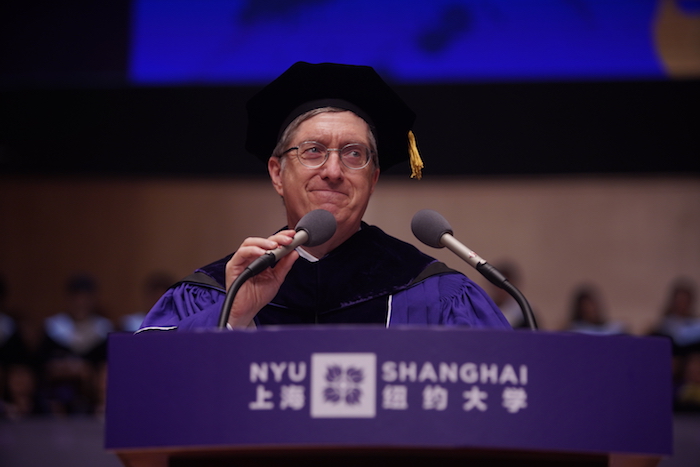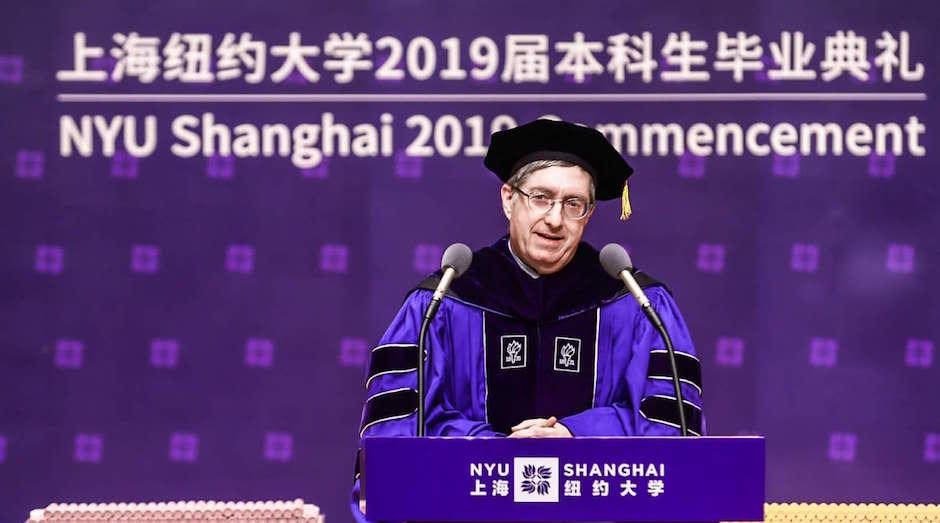"Members of the Class of 2019.
Today we all celebrate. We look back over your four years at NYU Shanghai with fondness, and we look ahead to the future with optimism.
To be sure, for me it is a wistful day. You are the last class of NYU Shanghai students to whom I taught Global Perspectives on Society. After your class, I handed GPS over to Professors Corpis and Weslake, and I haven’t taught it since.
Some of you asked me whether it was something you did. Whether you are the reason I quit. Whether it’s your fault. The honest answer is yes. After teaching GPS to your class, I realized I could never again study this material with such amazingly gifted students. The class was perfect, and after you it could only go downhill. So I just had to stop.
You will remember that during our last GPS class two months ago we talked about Atul Gawande’s book, Being Mortal. We talked about his message to doctors that their patients place much less value on just being alive than they do on living what he calls “a life of worth and purpose.” We talked about what such a life might involve.
As it happens, a few weeks ago the Journal of the American Medical Association published an essay by Tyler VanderWeele with a very similar message, asking doctors to think not only about whether their patients are physically healthy, but rather about whether their patients are “flourishing.”
After reading VanderWeele’s essay, I started to feel guilty. Because during our discussion of Being Mortal, I did the “Socratic Method” thing. I suggested that the right answer to the question, “What makes a life worthy, purposeful, and flourishing?” is, “It depends.” I suggested that the answer is different for every person.
I started to feel guilty because, in reality, I know the answer. I know what you need to do in order to have flourishing lives of worth and purpose. And I didn’t tell you.

So, I have decided to tell you now. Here are the eight things that you need to do to have flourishing lives of worth and purpose after you graduate today.
First, do not focus on whether you are meeting some other person’s definition of “success.” Focus instead on whether you feel, in your heart of hearts, that you are lucky to be doing the variety of things that you are doing each day, each month, each year.
Second, understand that worth and purpose and flourishing involve a mix of activity in three different domains: family relationships, other social and community relationships, and productive work for which you may or may not get paid. That mix will vary over the course of your life. In some phases you will emphasize work, in others family, and in others community. But you will probably be happiest if you keep all three domains going, at least a little bit, at all times.
Third, sustain the habits that you built up as students at NYU Shanghai, the habits that research shows will nourish your creativity. For example, keep hanging out with people whose first culture was different from your own. Keep visiting other countries, at least once every two years. Keep reading tons of books, at least six each year, regardless of whether they are fiction or nonfiction, biography or fantasy. Keep on tasting the widest variety of experiences you can. Protect time for yourself to feel bored, to do things you are bad at, to do things that have no value for your resume.
Fourth, understand that there are many perfectly good reasons to take a job or to stay with a job. It may pay you well in money or prestige. It may leave you feeling every day that you have helped someone enjoy a better life. It may require you to use all your skills. It may require you to use the one skill you most enjoy using. It may offer you colleagues who are exceptionally talented. It may offer you colleagues whose values you admire and who treat you with respect. It may be pleasurably all-consuming. Or it may allow you to invest significant time each week in meaningful activities that have no relation to your work.
Fifth, since no one job will have all the virtues I just enumerated, use your 5-year birthdays to think about whether you want to make a change. On your 25th, 30th, 35th, and 40th birthdays, and on and on, spend the day thinking about what you want to do during the next five years. If you feel like you are flourishing, then you may well want to keep doing whatever you’ve been doing. But if you don’t feel like you are flourishing, look around and consider whether you want to try something different. A full life involves adventure, in which you search, explore, solve problems, overcome challenges, invent, and create. Even though no one job can give you all of those things, a series of jobs across a career certainly can.
Sixth, be careful online, because what you type lasts forever. Focus on the tone of your communications even more than you focus on their content. If you always use a tone that is 10% less confident than you really feel, it will protect your ability to change your mind in the future without looking like an idiot. Use emails and texts to persuade, not to vent; if you want to be angry or snarky or insulting, do it live and in person, face to face. Angry writing is guaranteed not to persuade, even if your logic is perfect. And as you all know, I think anonymous speech is one of the most destructive forces in our world today, so please don’t indulge in it.
Seventh, speaking of online, don’t count followers, or likes, and don’t worry about your ratio of followers to likes. Those are statistics about a large universe that jumbles together people who care about you and people who don’t. Instead, identify two or five or ten people whom you respect and whom you are absolutely certain care for you. Spend quality time with them. Tune out the noise and listen to them. Ask them what they think of your ideas or your pictures. They are the only ones who should matter to your sense of self.
Eighth, when you make a mistake, when you fail in front of others, don’t beat yourself up about it. Everybody fails from time to time. When it happens, get back up, dust yourself off, ask forgiveness if your mess-up hurt somebody else, and move ahead.
That’s it.
And now, members of the NYU Shanghai Class of 2019, as you embark on your flourishing lives of worth and purpose, lives of service to a world that desperately needs you, let me conclude by sharing a few hopes that we, your teachers, hold for you:
May you enjoy the special pleasures of craft—the private satisfaction of doing a task as well as it can be done.
May you enjoy the special pleasures of profession—the added satisfaction of knowing that your efforts promote a larger public good.
May you be blessed with good luck, and also with the wisdom to appreciate when you have been lucky rather than skillful.
May you find ways to help others under circumstances where they cannot possibly know that you have done so.
May you be patient, and gentle, and tolerant, without becoming smug, self-satisfied, and arrogant.
May you always be able to confess ignorance, doubt, vulnerability, and uncertainty.
May you build long and loving relationships with people whom you respect.
May you know enough bad weather that you never take sunshine for granted, and enough weather like today that your faith in the coming of spring is never shaken.
May you continue to travel frequently beyond the places that are comfortable and familiar, so that your appreciation for the miraculous diversity of life grows ever stronger.
And may your steps lead you often back to Shanghai. Back to Pudong. For you will always be members of the NYU Shanghai family. And even after we have moved our campus to Qiantan, we will always be happy to welcome you home.
Congratulations."
--
More speeches from the ceremony:
NYU President Andrew Hamilton
Chancellor Yu Lizhong
Provost Joanna Waley Cohen
Peggy Yu Yu, Commencement Speaker
Anthony Comeau '19
Qu Jiayun '19


